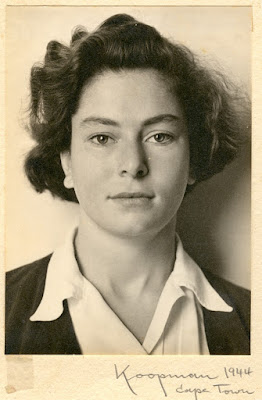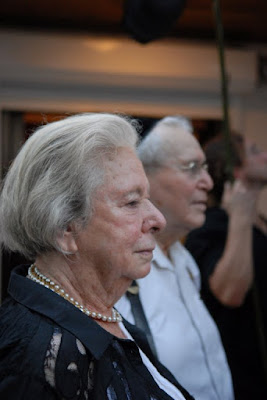Nina
Selbst was born in 1928, in Cape Town
Nina
Selbst's parents were the children of penniless immigrants
Nina
Selbst began to be troubled as she reached adolescence
Nina
Selbst
was born in 1928, in Cape Town, in the shadow of Table Mountain,
recently selected as one of the wonders of the world. In
fact, she became Nina Selbst from Nina Herbstein after she got
married. Her
parents were the children of penniless, immigrants
who had escaped the cruel antisemitism of Eastern Europe and, in
only a couple of decades of hard work, managed to establish
themselves in the community and open up to their children avenues of
personal and professional advancement. She
grew up, with three brothers, in the seaside village of Muizenberg
in a comfortable, secure, middle class environment. Discrimination
against non-whites was part of the accepted order of society but it
was very much milder than the virulent, ideological form it took in
the later years of Apartheid. It seemed quite natural until she
reached
adolescence and began to be troubled by the injustice of sorting
human beings into a rigid hierarchy by the color of their skin.
 |
| muizenberg beach |
Welcome!
Nina Selbst
Your
Real Name
I
was born Nina Herbstein but, though a feminist by inclination, on
marriage took my husband's surname, so I am Nina Selbst
Best
Memories of Childhood:
Growing
up in the wonderful village of Muizenberg, enjoying the most
beautiful surroundings of the Cape Peninsula, swimming in the Indian
Ocean, horse-riding along the beach with its endless white sands,
scrambling up the Muizenberg mountain, canoeing on the Vlei – all
in the company of great friends and almost free of adult supervision
 |
| Childhood Portrait |
.
My
Education:
After
a brief few years at a co-educational school, I was moved to a
girls' school, where I completed my high school education. I was a
good student but found most of what was offered as 'education'
excruciatingly boring. Real intellectual challenge came from a home
in which everything (with the exception of sex and death) was
discussed in front of the children and with their active
participation, and from my peers in the far left Zionist Socialist
Youth movement that I joined at fifteen
 |
| in 1944 |
.
What
career did you plan?
For
a number of years I wanted to be a chemist and nothing else.
Fortunately for me I realized, after only a year of academic study
in the field, that this was not for me and I turned to the social
sciences.
What
languages can you speak and write?
English
is my mother tongue but I also speak, read and write Hebrew
freely...I was once reasonably fluent in Afrikaans, the other
language of white South Africans, but regrettably my competence has
faded over years of disuse. Even more regrettably, the languages of
Black South Africans were a closed book to me .I enjoyed learning
Spanish, which I found useful as a tourist, but was always better at
speaking carefully prepared sentences than at understanding replies
delivered at express train speed
 |
| with her grandmother, father and first son |
.
What
is your biggest source of inspiration in life?
That's
a hard question. I suppose that at this stage of life it is watching
my eight granddaughters grow into such fine human beings, each in her
own way.
What
hurts you most in this world?
In
a most general sense, the unnecessary suffering that human beings
inflict on one another. More specifically, the failure of the two
peoples who occupy the narrow strip of land that I call home, to find
a way to live, together or apart, in peace and mutual respect
 |
| at the shrine of mamiwater near the Volta river |
.
If
you had to live a day in your life as a living or dead personality,
who would it be and why?.
Moses,
on the last day of his life. I would devote that day to writing my
autobiography so that future generations could have an authentic
account of what really happened in those distant days, straight from
a participant and eye witness. On second thoughts though, perhaps
Moses is not a valid choice, being in all probability neither living
nor dead, but a creature of the fertile human imagination.
What
is your favorite genre?
History,
both fiction and non-fiction but most particularly the seamless
combination of the two, wonderfully represented by Hilary Mantel's
Wolf Hall, for instance. It is a genre that provides a wealth of
insights into the enduring sources of human motivation.
When
did you start writing? What is the purpose of your writing?
My
earliest writing was not from choice. From the moment that I learned
to put pencil to paper, I was expected to write – happy birthday
greetings and get well wishes to my grandparents, thank you notes for
birthday presents received and so on. My early efforts were rather
stilted and standardized, but the habit became firmly established.
From the time I left home I wrote to my parents every single week and
kept them abreast of all, (well perhaps not quite all!), that was
happening in my life
Which
of your work has been published so far? Would you like to share a
synopsis of your work?
Disregarding
a miscellaneous collection of articles, reports and professional
papers, short stories and accounts of family history intended for a
limited circle, my one published work is "Writ in Water"
(November 2015)
The.
book is a wide-ranging account of the diverse ways in which water
is intertwined with the story of humanity. It opens with creation
myths, those narratives never lacking a role for water, invented to
explain how our world began. It closes with a listing of place names
the world over, all with references to watery features of the
landscape. In between it offers accounts of clean drinking water and
foul, of irrigation – ancient and modern, of cleanliness and
godliness, of exploration of the unknown along great rivers, of water
wheels and hydroelectricity, of art and poetry and a good deal more.
The
researching and writing of this book has been a fascinating journey
of discovery for me. I can only hope that it will provide both
pleasure and enlightenment to anyone who undertakes to read it.
Forthcoming
writing, future plans
Perhaps
I will manage a little story book for my two great grandsons, but at
the age of eighty seven, plans for the future really belong in the
same realm as green bananas.
What
is generally your preference in reading – a paper book or ebook?
And why?
I
love the look and feel of printed books but cannot resist the
enchantment of having a book at my disposal seconds after deciding to
read it, with the additional bonus that it makes no demands for space
on my crowded bookshelves. I feel no obligation to choose between
them.
Your
dream destination on earth
The
top of Mount McKinley. When I was sixty I promise myself that I was
going to climb the highest mountain in America at the age of ninety.
As the date approaches I must acknowledge that it is going to remain
a dream destination.
Countries
you have visited
I
have at least set foot on four of the five continents. Never made it
to Australia.
Last
book you finished reading?
Sapiens,
a Brief History of Humankind by Yuval Noah Harari
Current
book you are reading?
The
Little Prince Returns by Yoram Selbst.
Just
published in Hebrew. Not yet available in English
Your
favorite movie?
The
African Queen. A funny and moving story of two people discovering
love in a very surprising setting. Perfect performances by two great
actors – Katherine Hepburn and Humphrey Bogart.
Favorite
celebrity?
I
have no taste for celebrities.
What
comes to your mind when you think of India?
Bhagvad-Gita,
Mahatma Ghandi, curry, colonialism, sacred cows, funeral pyres and
widows' homes on the banks of mother Ganga, grinding poverty and
enormous potential
First
thing you do in the morning after waking up?
Let
the dog out.
The
last thing to do before sleep
Read
until the book falls from my hand.
The
last line of your autobiography would be..
Past
Imperfect – that sums up this story.
The
title of your autobiography would be…
Truth
to tell…
Links:
ISBN-10:
1512368687
ISBN=13:
978-1512368680
ASIN:
B017R90QMB


No comments :
Post a Comment
Thanks for visiting and commenting.